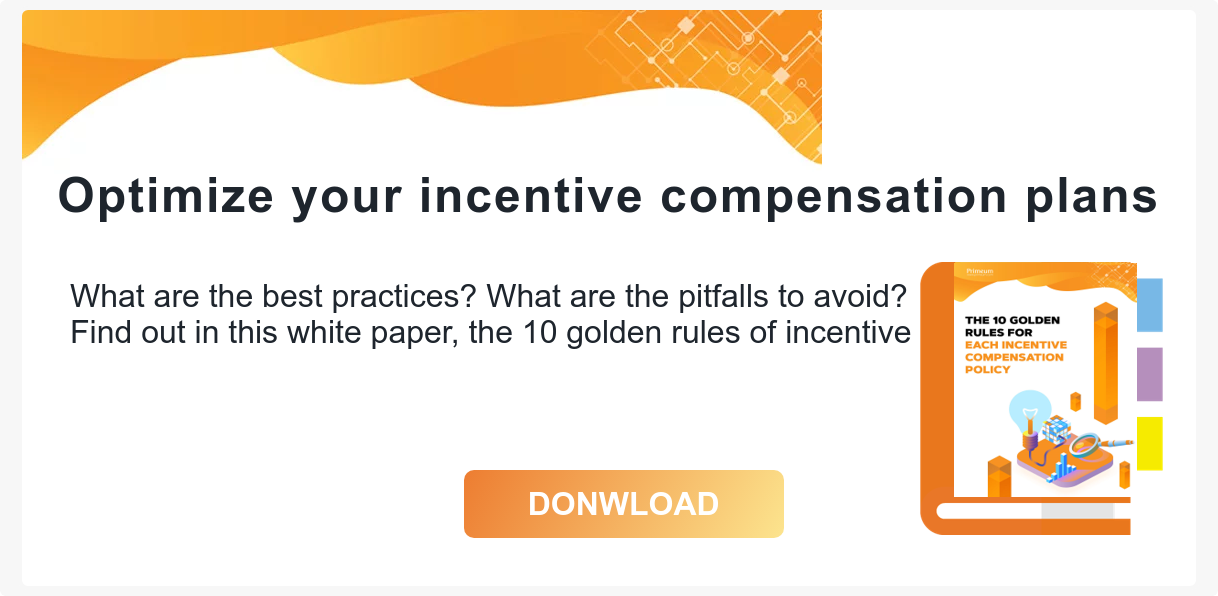The health crisis linked to the COVID-19 pandemic has had direct consequences on the economy, particularly on company activities. With shops closed during lockdown and a general drop in sales in most sectors of activity etc, employees are bound to be affected and it is now essential to adapt incentive compensation schemes.
Salesforces, population groups directly affected by the drop in sales, are thus having their targets revised and rethought. In this article, find out how to revise your company’s targets, both national and individual.
TARGETS CANNOT BE REVISED BEFORE PERFORMING A PRIOR ANALYSIS
Affecting different industries, products and distribution channels etc, lockdown has not had the same effect on sales in the various sectors. Before considering revising targets, it is essential to carry out a real upstream analysis of the workforce and sales situation. Depending on the teams and the different components of the pay packages already in place, decisions to revise targets may differ within the same company.
It is important to pinpoint how lockdown has affected sales at national level, and then to analyse the homogeneous nature of these consequences for all employees. To be consistent, the action plan has to be based on a decision-support table derived from observations in the field.
KEEPING TEAMS COMMITTED THROUGH TRANSPARENT COMMUNICATION
Now that lockdown is over, companies have the chance to perform detailed analyses. It is essential to give teams visibility as soon as possible. Firms must look at how they revise targets and their assessment of the impact of lockdown on the realisation of these targets etc, and not hesitate to question the relevance of their national target(s) as well as the individual targets set for each employee.
Companies must tell their employees very quickly if they plan to revise their targets downwards, specifically referring to the analysis methodology they have used to reach this decision. To keep teams committed, particularly salesforces who need to stay highly motivated for their prospecting assignments, it is crucial to communicate and reassure employees about the nature and challenges of this exceptional situation.
HOW CAN COMPANIES REVISE NATIONAL TARGETS?
The budget approach
The budget approach is based on the distribution of the bonus package which the company will be able to distribute in a period when it is economically weakened.
Depending on the performance period, reflection on the budget package can materialise in two different ways.
-For a short cycle, once the bonus package has been determined, it is possible to deduce the revision of national targets enabling this package to be distributed precisely;
-For a short cycle, reasoning is based on a projected package with regard to the performance observed after
lockdown. This projection will be used to define the revision of annual targets. However, the package distributed at the end of the year will also depend on performance in the second half of the year.
The performance approach
The performance approach involves thinking about how to limit the effect of the lockdown period on individual and collective performance. In this context, the approach to limiting external effects on performance involves properly defining a new revision of national targets which is somewhere between:
-The actual revision of targets observed at the end of the lockdown period;
-The actual revision of targets observed before the lockdown period;
-A completely neutral revision of targets.
The company will subsequently have to ensure that the package distributed with this new revision of national targets complies with the various existing budgetary constraints.
HOW CAN COMPANIES REVISE SECTOR-SPECIFIC TARGETS?
The correlation between sector-specific targets and national targets depends on the context
Sales representatives have been moderately affected by lockdown. Consistency needs to be maintained between the revision of national targets and that of sector-specific targets. Indeed, where sales representatives are affected in a relatively uniform manner, the revision of sector-specific targets must remain identical to that of national targets. Thus, if the operational reality imposed by the context leads to 9% lower revision of national targets, then the performance expected from each employee must also be reduced by 9%.
If the salesforce has been affected differently by the lockdown period and, more broadly, by the health crisis, then individual situations must be distinguished from one another. Indeed, insofar as each sales representative is affected differently, local management needs to be heavily involved in the process of revising individual targets to continue to ensure that targets are fair for everyone.
Supporting managers in the process of revising their employees’ individual targets requires the implementation of precise decision-support rules so that they can make fair adjustments. In addition, a process will need to be defined in which managers approve revised targets.
THE LEGAL ISSUE: AT THE CENTRE OF THE FAIR REVISION OF TARGETS
In terms of incentive compensation, and more particularly setting targets, strict application of employment law is the rule, regardless of the context.
In a previous article focussing on the revision of targets, Alix Frileux, a partner at the Versant law firm, explained that “there is no obligation to modify the targets of incentive compensation in the case of lockdown or partial activity as law currently stands and to our knowledge”.
She also recalled employers’ legal obligations in terms of setting targets, SMART (specific, measurable, assignable, realistic and time-related): “it seems to us that given employers’ obligations – to be loyal and set realistic and achievable targets for employees receiving incentive compensation – a review could be conducted after the crisis based on assumptions so as to reassess the amount of bonuses to be paid”.
THE LUXURY SECTOR: WILL WE SEE AN EXTRAORDINARY BOUNCE-BACK AFTER LOCKDOWN?
When it reopened after lockdown, Hermès’s sales exploded with a record turnover of over $2.7 million in China in a single day. The luxury sector was hit hard by the consequences of the COVID-19 health crisis. According to recent estimates by the consulting firm Bain & Company which were published in a Challenges.fr article, the global luxury market is expected to shrink by 20% to 35% this year.
THE PANDEMIC HAS TRIGGERED A HISTORIC DROP IN SALES IN THE LUXURY SECTOR
The stakes of recovery are huge. China, the world’s biggest luxury market, accounts for over 40% of global sales for the major French brands. According to a recent McKinsey study on the impact of COVID-19 across sectors, Chinese consumers remain the biggest growth opportunity for the luxury sector.
THE POST-LOCKDOWN BUYING FRENZY IS UNEXPECTED AND TEMPORARY
The raid seen at Hermès and other major brands does not signal the permanent return of consumers in stores. According to industry experts, the recovery in sales is expected to be extremely gradual. As such, Cyril Drouin, Chief eCommerce Officer for Greater China at Publicis Groupe, said in a Challenges.fr article published last June that “consumers have saved money during the health crisis period and no longer have the opportunity to travel abroad where they usually stock up on luxury items. Large parts of the luxury goods industry remain greatly affected, such as jewellery and watches”.
THE AUTOMOTIVE SECTOR: IS IT HEADING FOR A BIG CLEARANCE?
The automotive sector is in dire need of cash. The majority of car dealerships had to close their doors during lockdown and the consequences of these closures were not long in coming.
With the car market having completely stalled, dealers have accumulated enormous stocks and no longer have enough parking space to keep these goods for much longer. What solution have the big French car brands found? Sell off huge stocks of vehicles and shift them quickly.
According to a recent survey published by the CNPA (the French national council of automotive professions) and published in Le Parisien, French dealers have only 45 days of cash left.
Against this backdrop of exceptional sales, companies have had to revise their national as well as sector-specific targets and adapt their bonus schemes accordingly. As such, according to Alix Frileux, a partner in the Versant law firm mentioned above, “to determine whether the targets or the amount of the bonuses can be amended, the situation should be assessed on a case-by-case basis, taking into account the nature of the bonus in question (contractual, conventional or unilateral), the methods used to set targets, the period covered by the bonus and the conditions under which the employee acquires it (individual and/or collective objectives)”.
Redefining national and sector-specific targets requires real reflection and a certain investment on the part of companies, both upstream to assess the diversity of individual situations as objectively as possible and throughout the performance period, where support for managers will be key (involving the provision of clear rules for revision and the establishment of a process for approving revised objectives etc.). To help you set up your communication and goal redefinition strategy, discover here the no. 4 tool from our Restart Program dedicated to the resumption of your activities!





